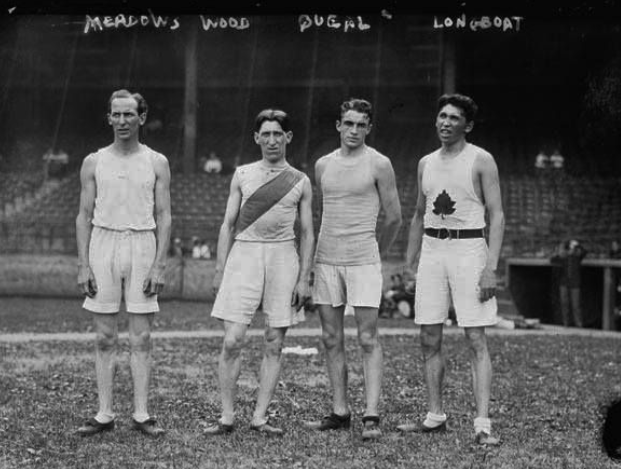In the early part of the twentieth century, foot racing was a popular spectator sport, commanding as much attention as major league hockey, baseball and soccer do today.
Crowds cheered local runners at small town races held at places like Exhibition Park in Guelph, and people eagerly anticipated the high-level competitions where the best runners in the world would meet. The ranks of fans included everyone from working class people to King Edward VII and Queen Alexandra.
Champion runners were celebrities. Their names were household words, and their accomplishments made front page news. Among the elite was Canada’s Tom Longboat, the fleet-footed Onondaga runner from the Six Nations Reserve near Brantford who became a legend.
But Longboat wasn’t the only Canadian dazzling everyone with his speed. There was a man whom the press dubbed the Guelph Flyer who became one of the stars of the track in his day, but who is now forgotten.
Fred Meadows was born in Rockwood in 1886. He moved to Guelph in 1904 and went to work as a moulder for the Taylor-Forbes Company. A Guelph city directory from that period shows him residing on Queen Street.
Meadows was initially interested in bicycle racing and competed in cycling events across the country. However, soon after his arrival in Guelph he turned to foot racing and won a Thanksgiving Day cross-country event. He began to attract attention not only because of his swiftness, but also due to his unorthodox training methods. Meadows used a horse as a pacer. He could often be seen running along local rural roads side-by-side with a trotter. Meadows also ignored the dieting program that was part of most runners’ training systems.
Meadows quickly swept past all local competition in middle and long-distance running. It was expected that he would be a member of the Canadian team headed for the 1908 Olympics in England, but the committee choosing athletes for that event passed him over. Determined that Meadows should compete with the world’s best, a Toronto sports promoter named Tom Flanagan and a Rockwood man named George Lawrence put up the money to send him to London.
The English climate didn’t agree with Meadows, and he was unable to achieve the form he’d shown in Canada. His best effort was a fourth place finish out of twenty runners in a five-mile race. It was still among the best showings for the Canadian contingent.
Back in Canada, Meadows quickly returned to his winning form. After breezing to victory in almost every amateur competition he entered, Meadows went professional so he could find suitable opponents. He took on Tom Longboat and other noted Canadians, and top runners from the United States, Britain, Sweden and Italy – and beat them all.
The Toronto Globe called him “the Guelph Flyer” and “The Guelph Speed Marvel.” He made a point of letting the press know that he didn’t want to be called “Meadows of Toronto.” He also wasn’t pleased when the American press, which had a tendency to portray all Canadians as rustics, labelled him as a farmer.
Meadows’ best period as a runner was from 1908 to 1910. He earned a world championship crown by winning two long-distance races in Toronto and a third at Madison Square Gardens in New York City. In one of his best performances, he broke a long-standing world record for the 15-mile run.
In one race, Meadows showed that in addition to being swift, he was tough, completing the run even though his feet had broken out in painful blisters.
Meadows found himself in hot water in 1908 when he won the Quebec Marathon in Quebec City. He wasn’t eligible to participate in that race because he wasn’t a resident of the province of Quebec, and so had run under an assumed name, only to be recognized later. Meadows explained to the satisfaction of the Canadian Amateur Athletics Union that he’d paid his own expenses to go to Quebec and had not been made aware until his arrival that the race was open only to residents. He’d run under another name at the suggestion of some friends. Meadows argued that the race had initially been misrepresented to him and he requested that the union take into consideration his sterling record as an athlete.
In February of 1910, Guelph City Council honoured Meadows with a banquet that was attended by Mayor George D. Hastings and over 100 of the city’s most prominent citizens. They presented him with a gold medal and an illuminated copy of the address that was read by Alderman George J. Thorp.
On December 6, 1912, Meadows beat Tom Longboat in a 10-mile race held at Guelph’s Victoria Rink. On September 12, 1913, he beat the star British runner Alfred Shrubb in a five-mile race in the city’s Winter Fair Building. Those were Meadows’ last races in Guelph. By that time, foot racing was losing its popular appeal in Canada. Even the top runners like Meadows and Longboat were no longer drawing big crowds.
In 1918 Meadows moved to Windsor where he eventually coached amateur hockey. He died there on December 17, 1975, at the age of 90. The Windsor press noted the passing of the “Former World Champion,” but in Guelph the death of the once-famous local runner appears to have gone unnoticed.



